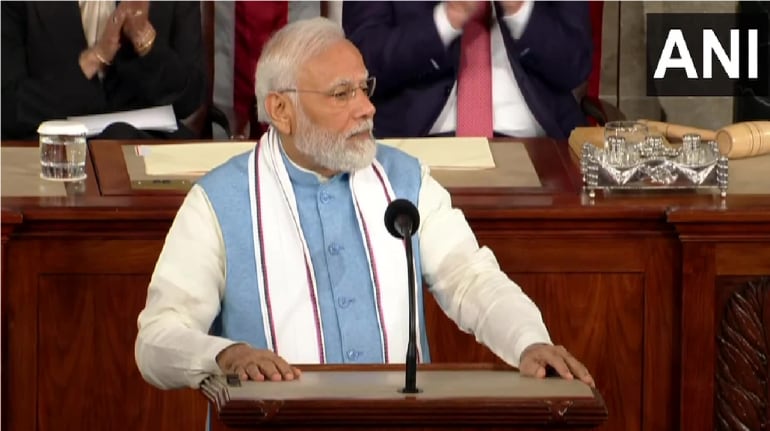



Prime Minister Narendra Modi’s decision to speak to Palestinian Authority President Mahmoud Abbas — and not Hamas — on Wednesday demonstrated India's support for the Authority, which it considers the legitimate representative of Palestinians.
Modi spoke to Abbas to express his condolences at the loss of civilian lives at the Al Ahli Hospital in Gaza. Over 500 were killed and scores injured in the attack on the hospital by the Israeli army.
Of the two Palestinian enclaves in Israel, the West Bank is controlled by the Palestinian Authority, and Hamas controls the Gaza Strip. Since 2006, a struggle has been on between them for control of the Palestinian movement for an independent homeland.
Barring a few, most Arab countries don’t recognise Hamas, and sees it as Israel’s ploy to dilute the Palestinian Authority’s authority.
Modi said on X: "Spoke to the President of the Palestinian Authority H.E. Mahmoud Abbas.
Conveyed my condolences at the loss of civilian lives at the Al Ahli Hospital in Gaza. We will continue to send humanitarian assistance for the Palestinian people. Shared our deep concern at the terrorism."
Since 2002, India has given $29.53 million in aid to Palestine.
Earlier, Modi had spoken to Israeli Prime Minister Benyamin Netanyahu to express solidarity and condemn the Hamas attack of October 7, which he called an act of terror.
The call to Abbas is a course correction as his post on X after the attack on Israel did not mention Palestine. The Congress and other opposition parties had criticised Modi’s post, and diplomats were confused whether it indicated a shift in India’s policy. Later, the Ministry of External Affairs clarified India’s stand.
The MEA statement called for a resumption of direct negotiations between Palestine and Israel to establish “a sovereign, independent, and viable state of Palestine, living within secure and recognised borders, side by side and at peace with Israel.”
Modi’s call to the PA President came amid rising outrage in the world and Arab countries about Israel’s action on the Palestinian people. Over 4,000 have been killed since the war began.
The two phone calls of Modi are attempts to strike a balance between the two sides.
Israel’s importance to IndiaFor India, Israel is an important strategic partner and the two sides cooperate in various fields, from security and intelligence, to high-tech, agriculture, and information technology. Israel is also a key defence supplier of India, and has stood by India during past crises.
Moreover, India has been a victim of terrorism from Pakistan for years, and it has campaigned globally to deal effectively with this menace. A refusal to criticise the attack would have disappointed Tel Aviv and raised questions about India’s fight against terrorism.
In addition, nearly 18,000 Indians live in Israel, either working or studying in the country.
India’s image in the Arab worldBut glossing over the situation in Gaza would also have raised eyebrows among its Arab allies.
The Israeli blockade of Gaza, where nearly 2.3 million Palestinians live, has created a dire humanitarian situation. People have been without food, water, medicine, power, and other necessities.
The situation was aggravated with the Israeli air force’s relentless bombing that destroyed buildings, hospitals, schools, churches, levelled entire neighbourhoods, and killed hundreds of people.
Israel is now planning a ground operation in Gaza to search for the 150 Israelis taken hostage by Hamas after the attack. Netanyahu has pledged to demolish Hamas.
The Palestine issue that had been put on the backburner by Arab leaders in recent years as they tried to normalise ties with Israel, has now come back to the centre stage. Rising anger in Arab streets has forced the leadership to change their stand on Israel.
The gulf countries and west asia are extremely important for India strategically. It is the main source of India’s energy, where over nine million Indians (added) live and work.
In addition, India’s economic partnership with the Gulf Coordination Council (GCC) and Arab countries has grown significantly on the back of increased trade and investment. Plus, if India wants to be the leader of the global south, it needs the support of the Arab countries.
Outrage in the Arab worldThe Israeli action on Palestine and America’s endorsement of it has outraged the Arab world.
Saudi Crown Prince Mohammed Bin Salman has strongly condemned the targeting of civilians in Gaza, and described it as a “heinous crime” and a “brutal attack.”
Egyptian President Abdel Fattah al-Sisi and Jordan’s King Abdullah II condemned the “collective punishment” of Palestinians in Gaza.
The two leaders and the President of the Palestinian Authority, Abbas, called off a meeting that US President Joe Biden had sought with them this week after the hospital attack. Egypt and Jordan have had ties with Israel since the 1970s.
Four other states — Bahrain, Morocco, Sudan, and the United Arab Emirates — established relations with Israel in 2020, after the Abraham Accord. It was widely believed that Saudi Arabia would soon follow suit.
But now there is little chance of Arab-Israeli relations being normalised in the near future.
Discover the latest Business News, Sensex, and Nifty updates. Obtain Personal Finance insights, tax queries, and expert opinions on Moneycontrol or download the Moneycontrol App to stay updated!
Find the best of Al News in one place, specially curated for you every weekend.
Stay on top of the latest tech trends and biggest startup news.